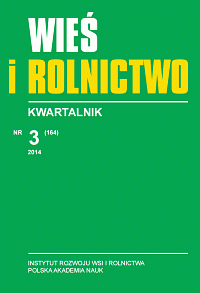„Płatność cukrowa” a dochody plantatorów buraka cukrowego w Polsce. Stan obecny i perspektywy
A „sugar payment” and the income of sugar beet growers in Poland. Current status and prospects
Author(s): Michał Borychowski, Andrzej Czyżewski, Sebastian StępieńSubject(s): Economy
Published by: Instytut Rozwoju Wsi i Rolnictwa Polskiej Akademii Nauk
Keywords: sugar beet; sugar market in the World; the European Union; Poland; a separate sugar payment; profitability of sugar beet production; the reform of the sugar market; rynek cukru; świat; Unia Europejska; Polska; oddzielna płatność z tytułu cukru
Summary/Abstract: The aim of this article is to present the importance of a separate sugar payment in Poland and its impact on the income of sugar beet growers in Poland. The article presents the structure and dynamics of the World, the EU and the Polish sugar market and sugar beet market, as well as the instruments of Common Agricultural Policy (CAP) for the sugar market, which provides a background for further consideration. The profitability of sugar beet production is shown in recent years in Poland and in comparison to Germany, one of the leaders in this sector of agriculture in the European Union. As results show in the paper sugar beet is being gradually displaced by sugar cane on a global scale. Following the reform of the sugar market (in 2006) in the European Union there many unfavourable changes occurred which have led to the cessation of sugar production in some countries, resulting in the total supply of this product decreasing and the EU becoming a net importer of sugar (even though for many years it had production surpluses and exported these). Sugar payments in nine countries, including Poland was one form of compensation for the loss of revenue of sugar beet growers caused by the introduction of this reform. According to the findings this payment is to be paid for the lasttime in 2014. Therefore it is necessary to consider the sense of the introduction of another support mechanism for sugar beet growers in Poland and other new member states of the European Union. An increase in the level of basic direct payment rate seems to be such a solution. It could improve profitability of sugar beet production in Poland. Celem artykułu jest ukazanie znaczenia oddzielnej płatności z tytułu cukru (tzw. płatności cukrowej) w kształtowaniu dochodów plantatorów buraków cukrowych w Polsce. Przedstawiono strukturę i dynamikę światowego, unijnego oraz polskiego rynku cukru i buraków cukrowych, a także instrumenty polityki rolnej Unii Europejskiej w zakresie rynku cukru i buraków cukrowych, co stanowi tło do dalszych rozważań. Dochodowość produkcji buraków ukazano w Polsce na przestrzeni ostatnich kilku lat oraz w odniesieniu do Niemiec, jednego z liderów w tym segmencie w UE. Jak wynika z poniższego opracowania, w ujęciu globalnym cukier z buraków jest sukcesywnie wypierany przez cukier trzcinowy. W wyniku reformy rynku cukru z 2006 roku w Unii Europejskiej nastąpiły niekorzystne, z punktu widzenia tej gałęzi, zmiany, które doprowadziły do rezygnacji z produkcji cukru przez niektóre kraje członkowskie, wskutek czego łączna podaż tego produktu zmniejszyła się do tego stopnia, że UE stała się jego importerem netto (mimo iż przez wiele lat osiągała nadwyżki produkcyjne i eksportowała je). Formą rekompensaty spadku dochodów plantatorów buraków cukrowych, który zaznaczył się po wprowadzeniu tej reformy miała być płatność cukrowa wprowadzona do systemów wsparcia w dziewięciu krajach, w tym w Polsce.
Journal: Wieś i Rolnictwo
- Issue Year: 164/2014
- Issue No: 3
- Page Range: 189-202
- Page Count: 14
- Language: Polish

